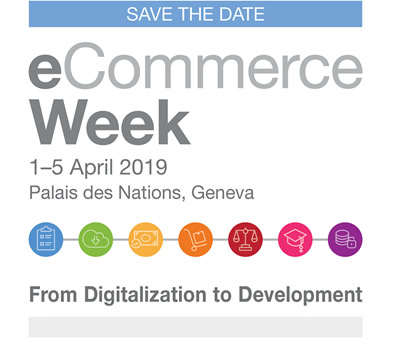Industry dialogue on trade facilitation for e-commerce development
3 Apr 2019 10:00h - 13:00h
Event report
[Read more session reports and live updates from the UNCTAD E-commerce Week]
Moderating the first session, Ms Victoria Tuomisto (Trade Facilitation Adviser, International Trade Centre) stated the session’s purpose: to strengthen the interaction between private and public sectors since e-commerce is fundamentally transforming how trade occurs on the global level.
Ms Marion Jansen (Director, Division of Market Development, International Trade Centre) emphasised that the soul of the economy lies in small and medium enterprises, and that there is a need for overcoming the information problem on how to sell across borders. This can assist with sustainable development goals.
Mr Wang Ning (President, China Electronics Chamber of Commerce) stated that whereas e-commerce works well in developed countries, it is still very new to developing countries. China is willing to help others since China’s purchasing power is growing and with proper coordination of international rules, cross-border e-commerce can flourish.
Mr Zhang Xianchen (Permanent Representative of the People’s Republic of China to the WTO, Ambassador Extraordinary and Plenipotentiary) emphasised the need for efficiency since although we can communicate at the speed of light, it still takes too long to deliver goods. This should occur without the cost of safety.
Moderating the second session, Mr Saeed (Senior Trade Facilitation Adviser, International Trade Centre) elaborated on how there needs to be more perspective from academia in trade facilitation. He introduced Dr Livio Robaldo (University of Luxembourg), an expert in legal informatics. Robaldo expressed the need for a dialogue between IT experts and lawyers in this growing technological world, especially in regard to e-commerce; he also discussed projects LAST-JD and MIREL, which aim to do this through the form of education. The legality of cross-border trade is difficult but important.
Mr Zhang Wiezhi (Founder of the TEGGS International Authentification Alliance, Consultant to the Expert Committee of CECC) then presented his idea of TEGGS, a comprehensive trade service platform that uses artificial intelligence to overcome difficulties with understanding different trade laws in crossing borders. It would create a new level of efficiency, establishing a ‘fast flow of data and cargo; high degree of management’ globally.
In the third session, various stakeholders were recognised for various contributions by Ms Shen Yueha (Secretary General, China Electronics Chamber of Commerce CECC) and by Ning.
Wiezhi moderated the fourth session, asking about trade facilitation, to which panellists agreed that efficiency and speed could be improved. Mr Carlos Santana (CEO, Asian International SL) addressed how his company has seen a 40 percent reduction in the time required in trade from Madrid to China. Similarly, Mr Feng Jie (General Manager, Shanghai CS&CM Co., Ltd.) has improved trade facilitation; where it used to take three to five days to get through customs clearance, it is now one day, decreasing cost and promoting efficiency. He spoke to the importance of up-to-date big data in market analysis.
Santana further discussed how, although e-commerce affects big companies, it can also benefit small and medium enterprises, which hold 70% of the economy in Spain. It is key to look at these businesses for the future when looking at regulation.
Regarding the topic of convergence, Ms Wang Zicui (Head of Global Purchasing of Vipshop (China) Co., Ltd.) advocated for a united front and a universal language in which there can be a dialogue between governments and businesses. There needs to be active communication about what is going well and what still needs work.
Mr Guo Yanrong (CEO, Shanghai Fumasoft Co., Ltd) spoke to this topic since the government customs area needs more efficient practices. He says his company has had success contacting the Chinese government to improve practices without costing safety in the process.
By Natalie Meyer
Related topics
Related event

eCommerce Week 2019: From Digitalization to Development
1 Apr 2019 15:45h - 5 Apr 2019 15:45h
Geneva, Switzerland
